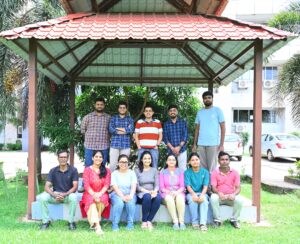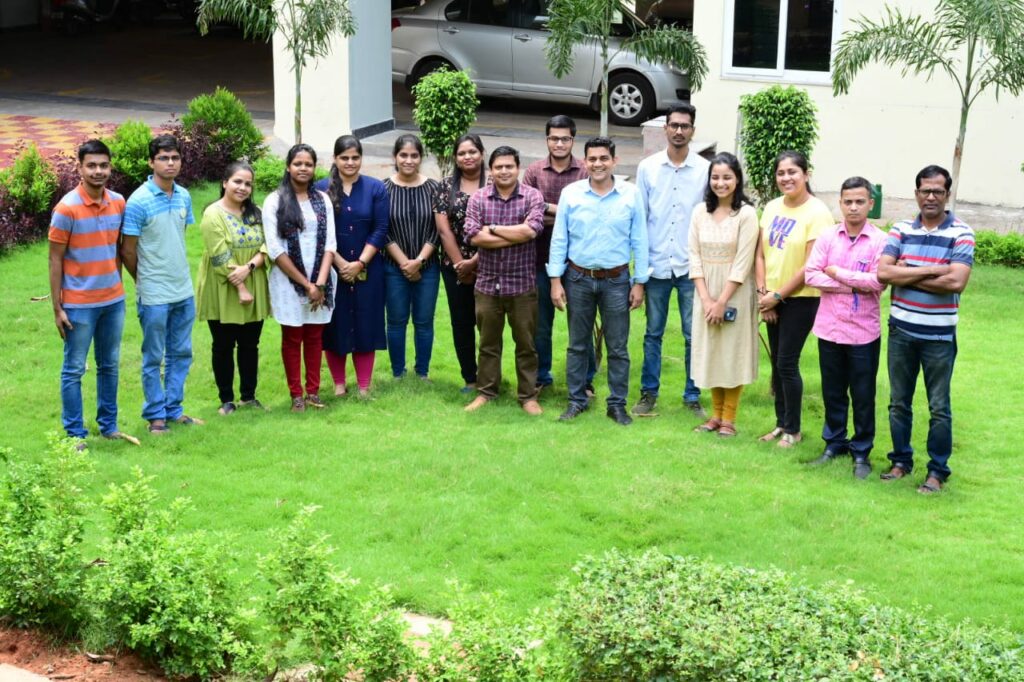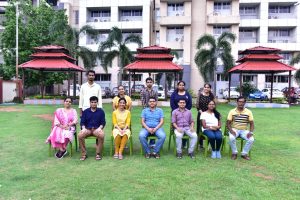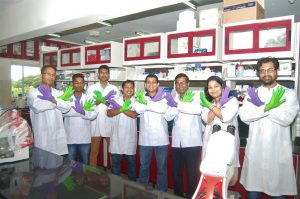Publications from ILS, Bhubaneswar
Original research articles
- Arjun OK, Sethi M, Parida D, Dash J, Kumar Das S, Prakash T, Senapati S. Comprehensive physiological and genomic characterization of a potential probiotic strain, Lactiplantibacillus plantarum ILSF15, isolated from the gut of tribes of Odisha, India. Gene. 2024 Dec 30;931:148882. doi: 10.1016/j.gene.2024.148882.
- Sethi M, Ok A, Dash J, Parida D, Kar S, Mishra S, Minz AP, Padhi A, Das KR, Pradhan B, Prakash T, Senapati S. Whole Genome Mining and Characterization of a New Probiotic Strain Levilactobacillus brevis ILSH3 from Handia: An Ethnic Fermented Beverage of Odisha, India. Probiotics Antimicrob Proteins. 2024 Feb 12. doi: 10.1007/s12602-024-10217-3.
- Minz AP, Mohapatra D, Dutta M, Sethi M, Parida D, Mohapatra AP, Mishra S, Kar S, Sasmal PK, Senapati S. Statins abrogate gemcitabine-induced PD-L1 expression in pancreatic cancer-associated fibroblasts and cancer cells with improved therapeutic outcome. Cancer Immunol Immunother. 2023 Dec;72(12):4261-4278.
- Dash J, Sethi M, Deb S, Parida D, Kar S, Mahapatra S, Minz AP, Pradhan B, Prasad P, Senapati S. Biochemical, functional and genomic characterization of a new probiotic Ligilactobacillus salivarius F14 from the gut of tribes of Odisha. World J Microbiol Biotechnol. 2023 Apr 27;39(7):171.
- Suresh V, Behera P, Parida D, Mohapatra AP, Das SK, Kumari S, Avula K, Mohapatra A, Syed GH, Senapati S. Therapeutic role of N-acetyl cysteine (NAC) for the treatment and/or management of SARS-CoV2-induced lung damage in hamster model. Eur J Pharmacol. 2023 Jan 5;938:175392.
- Jha A, Ahad A, Mishra GP, Sen K, Smita S, Minz AP, Biswas VK, Tripathy A, Senapati S, Gupta B, Acha-Orbea H, Raghav SK. SMRT and NCoR1 fine-tune inflammatory versus tolerogenic balance in dendritic cells by differentially regulating STAT3 signaling. Front Immunol. 2022 Sep 27;13:910705.
- Suresh V, Dash P, Suklabaidya S, Murmu KC, Sasmal PK, Jogdand GM, Parida D, Sethi M, Das B, Mohapatra D, Saha S, Prasad P, Satoskar A, Senapati S. MIF confers survival advantage to pancreatic CAFs by suppressing interferon pathway-induced p53-dependent apoptosis. FASEB J. 2022 Aug;36(8):e22449. doi: 10.1096/fj.202101953R.
- Minz AP, Das B, Mohapatra D, Suresh V, Mishra S, Senapati S. Gemcitabine induces polarization of mouse peritoneal macrophages towards M1-like and confers antitumor property by inducing ROS production. Clin Exp Metastasis. 2022 Jul 15. doi: 10.1007/s10585-022-10178-3.
- Singh B, Avula K, Chatterjee S, Datey A, Ghosh A, De S, Keshry SS, Ghosh S, Suryawanshi AR, Dash R, Senapati S, Beuria TK, Prasad P, Raghav S, Swain R, Parida A, Hussain Syed G, Chattopadhyay S. Isolation and Characterization of Five Severe Acute Respiratory Syndrome Coronavirus 2 Strains of Different Clades and Lineages Circulating in Eastern India. Front Microbiol. 2022 Jun 30;13:856913.
- Pradeepa, Suresh V, Senapati S, Chakraborty S. AKT inhibition sensitizes EVI1 expressing colon cancer cells to irinotecan therapy by regulating the Akt/mTOR axis. Cell Oncol (Dordr). 2022 Jul 14. doi: 10.1007/s13402-022-00690-9.
- Dutta M, Das B, Mohapatra D, Behera P, Senapati S, Roychowdhury A. MicroRNA-217 modulates pancreatic cancer progression via targeting ATAD2. Life Sci. 2022 Jul 15;301:120592. (Co-corresponding author)
- Sethi M, Mohanty V, Mishra S, Dash J, Mahapatra S, Parida D, Mohapatra AP, Mishra R, Prasad P, Parida A, Senapati S. Targeted (PCR-based) screening of antibiotic resistance genes’ prevalence in the gut microbiota of tribal people of Nabarangpur, Odisha, India. Lett Appl Microbiol. 2021 Dec 27. doi: 10.1111/lam.13642.
- Mohapatra D, Das B, Suresh V, Parida D, Minz AP, Nayak U, Mohapatra AP, Swain RK, Senapati S. Fluvastatin sensitizes pancreatic cancer cells toward radiation therapy and suppresses radiation- and/or TGF-β-induced tumor-associated fibrosis. Lab Invest. 2021 Nov 12. doi: 10.1038/s41374-021-00690-7
- Pradeepa, Suresh V, Singh VK, Nayak KB, Senapati S, Chakraborty S. EVI1 promotes metastasis by downregulating TIMP2 in metastatic colon and breast cancer cells. Int J Biochem Cell Biol. 2021 Nov 18;142:106118.
- Bishnoi S, Kumari A, Rehman S, Minz A, Senapati S, Nayak D, Gupta S. Fusogenic Viral Protein-Based Near-Infrared Active Nanocarriers for Biomedical Imaging. ACS Biomater Sci Eng. 2021 Jul 12;7(7):3351-3360.
- Suresh V*, Mohanty V*, Avula K*, Ghosh A, Singh B, R. Kumar R, Parida D, Suryawanshi AR, Raghav KS, Chattopadhyay S, Prasad P, Swain RK, Dash R, Parida A, Syed GH, Senapati S. Quantitative proteomics of hamster lung tissues infected with SARS-CoV-2 reveal host-factors having implication in the disease pathogenesis and severity. FASEB J. 2021 Jul;35(7):e21713.
- Suresh V, Parida D, Minz AP, Sethi M, Sahoo BS, Senapati S. Tissue Distribution of ACE2 Protein in Syrian Golden Hamster (Mesocricetus auratus) and Its Possible Implications in SARS-CoV-2 Related Studies. Front Pharmacol. 2021 Jan 14;11:579330.
- Raghav S, Ghosh A, Turuk J, Kumar S, Jha A, Madhulika S, Priyadarshini M, Biswas VK, Shyamli PS, Singh B, Singh N, Singh D, Datey A, Avula K, Smita S, Sabat J, Bhattacharya D, Kshatri JS, Vasudevan D, Suryawanshi A, Dash R, Senapati S, Beuria TK, Swain R, Chattopadhyay S, Syed GH, Dixit A, Prasad P; Odisha COVID-19 Study Group; ILS COVID-19 Team, Pati S, Parida A. Analysis of Indian SARS-CoV-2 Genomes Reveals Prevalence of D614G Mutation in Spike Protein Predicting an Increase in Interaction With TMPRSS2 and Virus Infectivity. Front Microbiol. 2020 Nov 23;11:594928.
- Senapati S*, Kshatri SJ*, Prasad P*, Turuk J, Pati S, Parida A. A pilot study to investigate the fecal dissemination of SARS-CoV-2 virus genome in COVID-19 patients in Odisha, India. medRxiv 2020.05.26.20113167 (preprint submission)
- Selim AM, Das M, Senapati SK, Jena GR, Mishra C, Nath I, Senapati S, Sethi M. Molecular detection of Theileria annulata infection in cattle by conventional PCR and quantitative real time PCR in India. J Parasit Dis. 2021 Mar;45(1):72-77.
- Paul P, Patel P, Verma SK, Mishra P, Sahu BR, Panda PK, Kushwaha GS, Senapati S, Misra N, Suar M. The Hha-TomB toxin-antitoxin module in Salmonella enterica serovar Typhimurium limits its intracellular survival profile and regulates host immune response. Cell Biol Toxicol. 2021 Mar 2.
- Katoch A, Jamwal VL, Faheem MM, Kumar S, Senapati S, Yadav G, Gandhi SG, Goswami A. Overlapping targets exist between the Par-4 and miR-200c axis which regulate EMT and proliferation of pancreatic cancer cells. Transl Oncol. 2021 Jan;14(1):100879.
- Jain S*, Samal AG* , Das B*, Pradhan B, Sahu N, Mohapatra D , Behera PK, Satpathi PS, Mohanty AK, Satpathi S, Senapati S. Escherichia coli, a common constituent of benign prostate hyperplasia (BPH)-associated microbiota induces inflammation and DNA damage in prostate epithelial cells. (2020) Prostate. Aug 24. doi: 10.1002/pros.24063
- Das, B, Senapati, S. Functional and mechanistic study reveals MAGEA3 as a pro-survival factor in pancreatic cancer cells. (2019) J Exp Clin Cancer Res. Jul 8;38(1):294
- Sharma GP, Gurung SK, Inam A, Nigam L, Bist A, Mohapatra D, Senapati S, Subbarao N, Azam A, Mondal N. CID-6033590 inhibits p38MAPK pathway and induces S-phase cell cycle arrest and apoptosis in DU145 and PC-3 cells. Toxicol In Vitro. 2019 Oct;60:420-436.
- Suresh V*, Sundaram R*, Dash P*, Sabat SC, Mohapatra D, Mohanty S, Vasudevan D, Senapati S. Macrophage migration inhibitory factor of Syrian golden hamster shares structural and functional similarity with human counterpart and promotes pancreatic cancer. (2019) Scientific Reports 9: 15507.
- Izhar S, Gupta T, Minz AP, Senapati S, Panday AK. Influence of regional and long range transport air masses on fog water composition, contribution and toxicological response at Indo Gangetic Plain. Atmospheric Environment. Volume 214, 1 October 2019, 116888
- Guha, D., Banerjee, A,. Mukherjee, R., Pradhan, B., Peneva, M., Aleksandrov, G., Suklabaidya, S., Senapati, S., Aich, P.: A Probiotic formulation containing Lactobacillus bulgaricus DWT1 inhibits tumor growth by activating pro-inflammatory responses in macrophages. Journal of Functional Foods. Volume 56, May 2019, Pages 232-245
- Jain S, Dash P*, Minz A*, Satpathi S, Samal AG, Behera PK, Satpathi PS, Senapati S. Lipopolysaccharide (LPS) enhances prostate cancer metastasis potentially through NF-κB activation and recurrent dexamethasone administration fails to suppress it in vivo. (2018) Prostate. September 27
- Jena KK, Kolapalli SP, Mehto S, Nath P, Das B, Sahoo PK, Ahad A, Syed GH, Raghav SK, Senapati S, Chauhan S, Chauhan S. TRIM16 controls assembly and degradation of protein aggregates by modulating the p62-NRF2 axis and autophagy. (2018) EMBO J. Aug 24.
- Patra D, Mukherjee S, Chakraborty I, Dash TK, Senapati S, Bhattacharyya R, and Shunmugam R.Iron(III) Coordinated Polymeric Nanomaterial: A Next-Generation Theranostic Agent for High-Resolution T1-Weighted Magnetic Resonance Imaging and Anticancer Drug Delivery. (2018) ACS Biomater. Sci. Eng. 4 (5), pp 1738–1749
- Pradhan B, Guha D, Naik AK, Banerjee A, Tambat S, Chawla S, Senapati S, Aich P. Probiotics L. acidophilus and B. clausii Modulate Gut Microbiota in Th1- and Th2-Biased Mice to Ameliorate Salmonella Typhimurium-Induced Diarrhea. (2018) Probiotics Antimicrob Proteins. Jun 16.
- Katoch A, Suklabaidya S, Chakraborty S, Nayak D, Rasool RU, Sharma D, Mukherjee D, Faheem MM, Kumar A, Sharma PR, Senapati S, Kumar LD, Goswami A. Dual Role of Par-4 in abrogation of EMT and switching on Mesenchymal to Epithelial Transition (MET) in metastatic pancreatic cancer cells. (2018) Mol Carcinog. Apr 19
- Kumari K, Das B, Adhya A, Chaudhary S, Senapati S, Mishra SK. Nicotine associated breast cancer in smokers is mediated through high level of EZH2 expression which can be reversed by methyltransferase inhibitor DZNepA . (2018) Cell Death Dis. Feb 2;9(2):152
- Mahapatra P, Jain S, Shrestha S, Senapati S, Puppala S. Ambient endotoxin in PM10 and association with inflammatory activity, air pollutants, and meteorology, in Chitwan, Nepal. (2018) Sci Total Environ. Mar 15;618:1331-1342
- Suklabaidya S, Das B, Ali SA, Jain S, Swaminathan S, Mohanty AK, Panda SK, Dash P, Chakraborty S, Batra SK, Senapati S. Characterization and use of HapT1-derived homologous tumors as a preclinical model to evaluate therapeutic efficacy of drugs against pancreatic tumor desmoplasia. (2016) Oncotarget. Jul 5;7(27):41825-41842
- Barman PK, Mukherjee R, Prusty BK, Suklabaidya S, Senapati S, Ravindran B.Chitohexaose protects against acetaminophen-induced hepatotoxicity in mice. (2016) Cell Death & Disease. May 12;7
- Jain S, Suklabaidya S, Das B, Raghav SK, Batra SK, Senapati S. TLR4 activation by lipopolysaccharide confers survival advantage to growth factor deprived prostate cancer cells. (2015) Prostate. Jul 1;75(10):1020-33.
- Sarkar S, Jain S, Rai V, Sahoo DK, Raha S, Suklabaidya S, Senapati S, Rangnekar VM, Maiti IB, Dey N. Plant-derived SAC domain of PAR-4 (Prostate Apoptosis Response 4) exhibits growth inhibitory effects in prostate cancer cells. (2015) Front Plant Sci. Oct 7;6:822.
- Maiti S, Patro S, Purohit S, Jain S, Senapati S, Dey N. Effective control of Salmonella infections by employing combinations of recombinant antimicrobial human β-defensins hBD-1 and hBD-2. (2014) Antimicrob Agents Chemother. Nov;58(11):6896-903.
- Sahu PK*, Das B*, Sahoo L, Senapati S, Nayak GD. Genetic relationship and population structure of three Indian local chicken populations as revealed by mtDNA D-loop. (2015) Mitochondrial DNA. Jul 10:1-3.
- Singh A, Jain S, Senapati S, Verma RS and Sahoo SK. Magnetic nanoparticles labeled mesenchymal stem cells: A pragmatic solution towards targeted cancer theranostics. (2015) Advanced Healthcare Materials. Sep 1
- Pati, S. Jain, M. Behera, A.P. Acharya, S.K. Panda, S. Senapati. X-Gal staining of canine skin tissues: a technique with multiple possible applications. (2014) Journal of Natural Science, Biology and Medicine. July;5:245-249
Reviews and letter to editor
- Mohapatra AP, Parida D, Mohapatra D, Nayak U, Swain RK, Senapati S. Zebrafish Larvae as a Model to Evaluate Potential Radiosensitizers or Protectors. J Vis Exp. 2022 Aug 25;(186). doi: 10.3791/64233.
- Mohapatra D, Mohapatra A.P, Sahoo A.K, and Senapati, S. In-vitro and in-vivo models for the identification and validation of radioprotectors and radiosensitizers. Journal of Applied Biology & Biotechnology Vol. 11(2), pp. 94-101, Mar-Apr, 2023
- Tripathy A, Dash J, Kancharla S, Kolli P, Mahajan D, Senapati S, Jena MK. Probiotics: A Promising Candidate for Management of Colorectal Cancer. Cancers (Basel). 2021 Jun 25;13(13):3178.
- Senapati S, Dash J, Sethi M, Chakraborty S (2020) Bioengineered probiotics to control SARS-CoV-2 infection. Research Ideas and Outcomes 6: e54802. https://doi.org/10.3897/rio.6.e54802
- Das P, Minz A, Senapati S. Possible autocrine function of galectin-3 in pancreatic stellate cells. Gastroenterology, August 2018
- Suklabaidya S*, Dash P*, Das B, Suresh V, Sasmal PK, Senapati S. Experimental models of pancreatic cancer desmoplasia. Lab Invest.2018 Jan;98(1):27-40
- Suklabaidya S*, Dash P*, Senapati S. Pancreatic fibroblast exosomes regulate survival of cancer cells. Oncogene; 2017 Jun 22;36(25):3648-3649
- Das B, Suklabaidya S, Jain S, Baisakh MR, Senapati S. MAGEA3 (melanoma antigen family A,3); Atlas Genet Cytogenet Oncol Haematol. April 2014.
- Senapati S, Chakraborty S, Nath I, Panda SK, Patra RC and Batra SK. Non- Human Prostate Cancer Cell Lines. Oncology, Gastroenterology and Hepatology reports. 2012; 1(1):15-24
Book Chapter
- Mishra S, Dash J , Mohapatra A, Sethi M, Senapati S. Probiotics based anticancer immunity in pancreatic cancer. Anticancer Immunity: Reviewing the Potential of Probiotics , pp 52-72, June 2023
- Das B, Senapati S. Immunological and functional aspects of MAGEA3 cancer/testis antigen. Adv Protein Chem Struct Biol. 2021;125:121-147.
- Senapati S, Singh RK and Batra SK. Tumor microenvironment: Blood vascular system in cancer metastasis. In: Systems Biology of Cancer, Editor: Sam Thiagalingam, Cambridge University Press London
*Both the authors have equal contributions; Underlined= corresponding author
|







